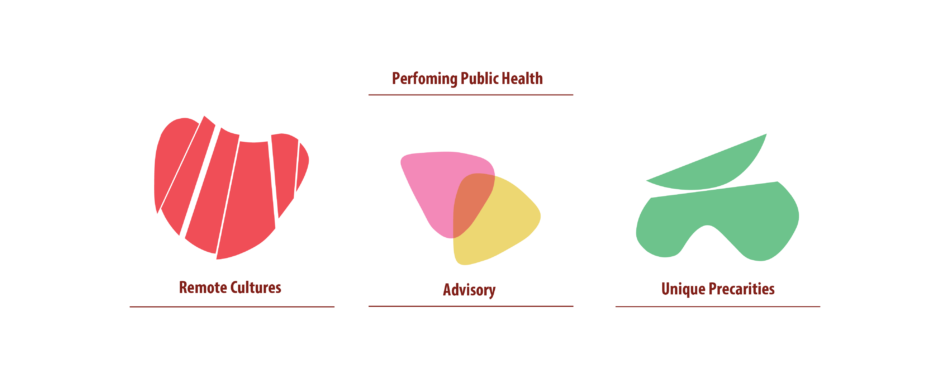Performing Public Health (2020)
I am the Lead Facilitator of a project called Performing Pubic Health for the Center for Arts in Medicine, as part of their COVID-19 Arts Response.
From our website:
How do we collectively Perform Public Health? Three overlapping teams of artists, administrators, health officials, academics, researchers and activists offer tools for safe engagement with the arts, chronicle the adaptive powers of artists, and organize resources emerging from artist communities, in an attempt to answer that question.
The Advisory team has created a Performing Public Health Advisory Brief, which offers basic suggestions for safe practices, as well as appendices on infection control recommendations, finding reliable information and links to articles and studies for artists and communities effected by COVID-19.
The efforts include contributions to the COVID-19 Arts Response Repository, helping to chronicle the performance of public health through the arts during the time of the pandemic.
Within these efforts, Remote Cultures emerge in response to the lack of human contact that a pandemic imposes. In this context, Remote Cultures are the artworks, gatherings, adaptations and connections we create when health measures dictate social distance. They are how we maintain closeness, creativity, expression when the space between us is dictated by a virus or a law, or mediated by a screen or mask. Visit this page for a curated focus on the arts adaptive power in the context of a pandemic created by this team.
Within public health measures, the needs of marginalized artists are not always thoroughly considered. They are uniquely precarious, made vulnerable by systemic racism, disability, poverty, compromised immune systems, age, and a number of other factors. Marginalized artists can also possess experiential expertise directly relevant to a pandemic. The Unique Precarities team curates the work of vulnerable artists and communities and places them alongside institutional research, to serve as an interdisciplinary index of creative support. Please visit this page for resources from Uniquely Precarious artists and the systems in which they are entangled.
Performing Public Health considers the specialized concerns of artists and public gatherings at a time when gathering for in-person art experiences is constrained by the possible transmission of an infectious disease like COVID-19. Please visit the resources below for more information.

Graphic Design by Edith Williams.
Performing Public Health
This project was created by the following humans:
- Meghan Moe Beitiks, Artist, University of Florida
- Aaron Colverson, University of Florida
- Chloe Dean, University of Florida
- maxpaº hina minga (charlee huffman), MFA, M.Div. (Kansa/Potawatomi)
- Srinjoyi Lahiri, Young Artivist Alliance
- Keely Mason, University of Florida
- Edith Moore Hubert, Jacksonville University, Linda Berry Stein College of Fine Arts
- Virginia Pesata, University of Florida
- Katrina Pineda, California Representative of the Arts Health Early Career Research Network
- Natalie Rella, University of Florida
- Jill Sonke, University of Florida
- Marina Tsaplina, Transdisciplinary Artist, Health Humanities Scholar, Disability Advocate
- Edith Williams, Graphic Designer
- Kaitlyn Wittig Menguc, Artist & Arts Consultant
We’re also very grateful to our colleagues working in the arts, social work and activism, Arts + Health and Art Place America for their input on the development of this project.
Project Credits and Citations:
- Pesata, V., Moore Hubert, E., Wittig Menguc, K., Beitiks, MM. (2020). Performing Public Health: Advisory. Retrieved from (insert URL).
- Colverson, A., Pineda, K. Lahiri, S. (2020). Performing Public Health: Remote Cultures. Retrieved from (insert URL).
- Tsaplina, M., Beitiks, MM., Huffman, C. (2020). Performing Public Health: Unique Precarities. Retrieved from (insert URL).
Leave a Reply